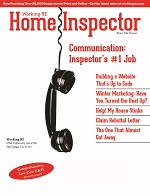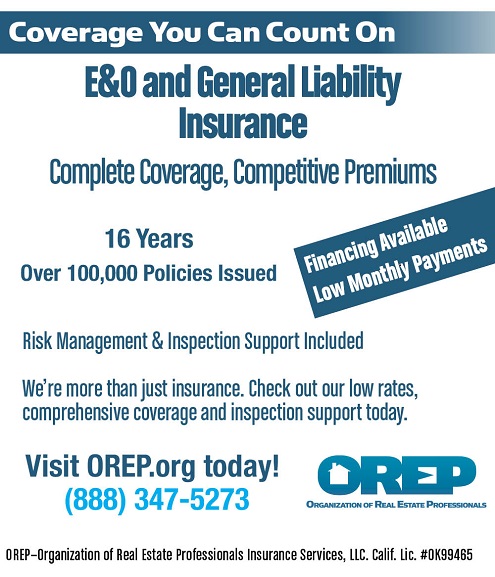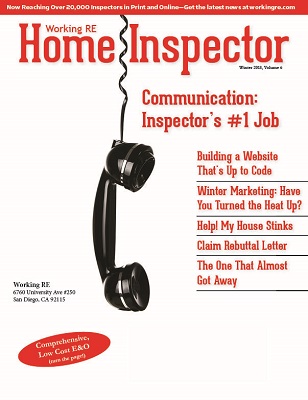 |
> E&O You Can Count On E&O/GL Insurance for Home Inspectors- *Broad Coverage *$1,000 minimum premium (choice of limits/deductibles) Shop OREP Now! |
Editor’s Note: This story appears in Working RE Home Inspector’s NEW January Print Edition. OREP E&O insureds receive guaranteed delivery of each print issue along with many other valuable business benefits.
> Now reaching 20,000+ Home Inspectors in Print and Online!
Managing Liability
By David Brauner, OREP.org Home Inspector E&O Insurances
A frequent question from OREP insureds is how to respond to a customer complaint. This is my careful and considered advice no matter where you get your coverage.
The answer is easy when a certified letter arrives from an attorney’s office: in this case, you definitely have a claim on your hands and it’s time to get it on the record with your insurance carrier and let the claims folks earn their money. But the answer is less straightforward when the seriousness of the “complaint” is uncertain—like in the case of a “rant” from an irate client via phone or email. Will it blow over or not? How you respond can have serious consequences for your business, whether you have insurance or not. If you missed something, that’s a clear sign to prepare for trouble. But what if you’re pretty sure your report is solid?
First, you should report anything to your carrier, even if you believe your report is error-free. If you have errors and omissions insurance (E&O), also called professional liability insurance, you undoubtedly will breathe a sigh of relief and sleep easier. If you do not have insurance you should hire an attorney early in the process if you think there are grounds for concern. Why? Because it’s very easy to make things worse when trying to handle a complaint on your own. For expert advice from a noted home inspector attorney on how best to respond to a complaint, see Five Tips for Managing Client Complaints (Visit WorkingRE.com, search “Complaints.”)
The gray area is when you’re not sure how serious the complaint is. When it comes to notifying an insurance carrier about a possible incident, many inspectors are hesitant to report something that they believe will not result in anything other than higher premiums. Even if there is a small problem, many believe it’s better to “handle” it themselves. The trouble is trying to predict what will or won’t mushroom into a bigger problem that you can’t handle. Many inspectors choose to fix a problem or refund the inspection fee just to get it off their plate quickly. They worry if they report it to their insurer, their premiums will go up. Hopefully, if you do take this route, you are savvy enough to get a release signed absolving you from further liability. But I believe it is not in your best interests to try to defend yourself.
Whatever you decide when the complaint falls into the gray area, you should understand a couple of things: your insurance policy/contract requires you to notify the carrier. This is because a delay can hurt your defense. Not reporting an incident can give your carrier legal footing to decline to respond to an otherwise covered claim, if it turns into something later. It’s rare for a carrier to pull this card—refusing to respond to an incident because it was not reported in a timely manner, but it can happen, especially if the delay in reporting hurts the defense.
Here’s another issue: if you renewed your E&O in the meantime and checked the box certifying that “you have no knowledge of any claims or incidents,” now you have made a misrepresentation on your application/contract. This is grounds for cancelation by the carrier, which may not have been possible otherwise under the laws of certain states. If you are cancelled, this will have to be reported to the next carrier on their application. If you choose to conceal it and get caught…well…it can snowball fast, making your initial error in judgement result in your becoming a “bad risk.” If you’re lucky, a good agent will find you coverage but it won’t be cheap. Who needs that?
Case for Notifying
My advice is that if you have insurance, report it to your insurance carrier and/or agent without delay. First, you’ll fare better with the help of experts. Most carriers such as the ones OREP uses have free help lines with in-house attorneys and risk managers who know how to make a problem go away if possible. It is easy to make a problem worse when you attempt to “handle” it yourself, if you are not experienced; admitting guilt is just one problem. So let the pros help you.
Many inspectors don’t report smaller issues because they believe their insurance rates will automatically rise—like auto insurance. While every situation is unique, at OREP we don’t typically see a change in premium where there is no loss. In plain English, this means where it does not cost the insurance company any money to resolve. There is what’s called a “loss reserve” put on every open incident, which is the insurance company’s estimate of how much the claim might potentially cost to settle. Insurance companies are required to keep enough cash on reserve to cover potential claims, which is one of the reasons for this. If you have ever been asked for a “loss run” when trying to obtain insurance, this is what they are asking for—a report showing your claims history, if any. If the issue is closed/resolved, it will show how much it cost, if anything. If it is open or still not settled, you’ll see a “reserve” estimate of how much it could cost to resolve.
To recap, reporting an incident when it happens keeps you “right” with your insurance carrier and enlists experts who can help you, often for free. If the complaint is frivolous and results in no loss/expense, it likely will not result in any increase in premium. Again, it’s case by case. But that is more typical than not.
Vanishing Coverage
Here’s another important reason to report a potential claim if you have Claims Made insurance, which most inspectors do. Let’s say you don’t report an incident to your insurance company, and then fail to renew on time or intentionally choose to end the policy and it lapses. In this case, if you did not report the incident from the past in a timely manner and you let your policy lapse, there is no coverage for that claim at all, even if you were covered at the time of the inspection! I know, it’s a difficult concept to accept, but please don’t shoot the messenger! All Claims Made insurance works this way and I know of no E&O program for home inspectors that is not Claims Made. In fact, most all professionals have Claims Made policies: appraisers, doctors, lawyers, accountants, engineers and so forth.
On the other hand, if you reported the incident when it happened, while the policy was in force, the insurance should be there for you even if you don’t have insurance any longer. That is best reason to report even seemingly small incidents. Switching carriers at renewal is fine as long as the new program offers what’s called “prior acts” coverage, which continues the coverage from the old policy/carrier forward to the new one, covering all your past work from the “inception” or start date of the policy. Always ask about prior acts if you are switching carriers.
If you have questions, ask your agent for answers. If you want great rates, broad coverage and many business-building benefits, call OREP! The latest offering from OREP is a 90-day home warranty program that takes off your plate many of the small nuisance complaints that we’ve been discussing. Let the professionals resolve warranty-covered issues for you to the satisfaction of your clients (but still report them!). Providing a home warranty to your clients puts you ahead of the competition and reduces your workload and stress. And the small, warranty-related claims are handled professionally—without you getting involved!
About the Author
David Brauner is Senior Broker at OREP, a leading provider of E&O Insurance for home inspectors and other real estate professionals in 50 states (OREP.org). He has provided E&O insurance to home inspectors for over 20 years. Contact him at dbrauner@orep.org or (888) 347-5273. OREP–Organization of Real Estate Professionals Insurance Services, LLC. Calif. Lic. #0K99465.
> Free Webinar:
Claims and Complaints: How to Stay Out of Trouble
Available Now
Presenter: David Brauner, Senior Insurance Broker OREP
David Brauner, Senior Broker at OREP, shares insights and advice gained over 20+ years of providing E&O insurance for inspectors, showing you how to protect yourself and your business. Watch Now!
Note: The January 2018 issue of Working RE Inspector mailed to over 20,000 home inspectors nationwide. OREP Insureds enjoy guaranteed delivery of each print magazine and many more benefits.




by Peter Ottowitz
What issues and/or concerns are there when a home buyer uses a video camera to video the entire home inspection? Can you legally stop them from doing a video?
-